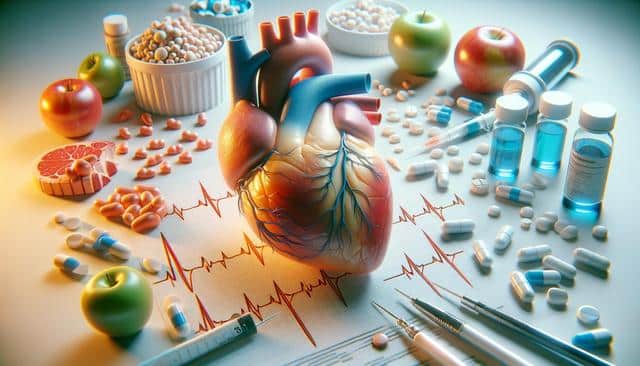Understanding Heart Failure and Its Early Indications
Heart failure is a chronic, progressive condition in which the heart is unable to pump blood efficiently enough to meet the body’s needs. While it often develops over time, early detection can significantly improve management and quality of life. Understanding the early signs of heart failure is crucial in taking timely action and avoiding complications. Early symptoms may be subtle and easily mistaken for other less serious conditions, which makes awareness essential. It’s important to note that heart failure doesn’t mean the heart has stopped working; rather, it is functioning less effectively.
In the early stages, individuals may feel more fatigued than usual, even with minimal activity. This occurs because the heart is not pumping enough oxygen-rich blood to meet the body’s energy demands. Another common sign is shortness of breath during everyday tasks or while lying flat, as fluid can start to build up in the lungs. Recognizing such changes can prompt individuals to seek medical attention before the condition progresses.
Shortness of Breath: A Common but Overlooked Sign
One of the hallmark early symptoms of heart failure is shortness of breath, also known as dyspnea. This symptom can manifest in different ways, including during physical exertion, at rest, or while lying down. It results from fluid accumulation in the lungs due to inefficient heart function. People often report waking up gasping for air or needing to sleep propped up with pillows to breathe comfortably.
Paying attention to how your breathing changes over time can be a helpful indicator. If you notice any of the following, it’s worth discussing with a healthcare provider:
- Increased breathlessness during everyday activities like walking or climbing stairs
- Persistent coughing or wheezing, especially at night
- Sudden weight gain due to fluid retention, which may worsen breathing
Because breathlessness is often attributed to aging or being out of shape, it is easily dismissed. However, when it becomes persistent or more pronounced, it could signal the early stages of heart failure and should not be ignored.
Fatigue and Weakness: Subtle Yet Significant
Many people underestimate the significance of fatigue, particularly when it occurs without a clear cause. In early heart failure, the heart struggles to deliver enough oxygen-rich blood to the muscles and organs, leading to a constant feeling of tiredness or weakness. This can affect one’s ability to engage in physical activities that were once manageable.
Unlike the usual tiredness that follows a poor night’s sleep or a long day, fatigue related to heart failure tends to:
- Persist throughout the day regardless of rest
- Worsen with physical activity
- Interfere with daily routines and productivity
In some cases, individuals may also feel mentally exhausted or have difficulty concentrating. These symptoms can be early indicators of diminished heart function and should prompt further evaluation, particularly if accompanied by other signs such as swelling or breathlessness.
Swelling and Weight Gain: Signs of Fluid Retention
Fluid buildup in the body, known as edema, is another early and often visible sign of heart failure. When the heart can’t pump effectively, blood flow slows and backs up in the veins, causing fluid to leak into surrounding tissues. This is most commonly observed in the legs, ankles, feet, and abdomen.
Key indicators of fluid retention include:
- Swelling in the lower extremities, especially at the end of the day
- Unexplained weight gain over a short period
- A feeling of tightness in shoes or socks leaving marks on the skin
While occasional swelling can occur for various reasons, persistent or worsening edema may point to a cardiovascular issue. Regularly checking your weight and taking note of swelling can help identify changes early on and support timely intervention.
When to Seek Medical Attention
Recognizing early signs of heart failure can make a significant difference in managing the condition and improving long-term outcomes. If you or someone you know is experiencing a combination of symptoms such as unexplained fatigue, shortness of breath, swelling in the legs, or rapid weight gain, it is important to consult a healthcare professional for a thorough evaluation.
Health providers may use a combination of physical exams, blood tests, imaging, and other diagnostic tools to assess heart function and determine the cause of symptoms. Timely diagnosis allows for the implementation of lifestyle changes, medications, and other treatments that may slow progression and enhance quality of life.
Being proactive about your cardiovascular health by understanding what the early signs of heart failure look like is a critical first step. Don’t wait for symptoms to become severe—early conversation with a doctor can lead to better outcomes.
Conclusion: Staying Informed and Alert
Understanding the early signs of heart failure empowers individuals to take control of their health. Symptoms such as fatigue, shortness of breath, and swelling may seem minor at first but can indicate an underlying issue that needs attention. By staying informed and paying close attention to these changes, individuals can seek timely care and potentially prevent more serious complications. Early recognition, combined with lifestyle adjustments and medical support, offers a proactive path toward better heart health and improved daily living.
